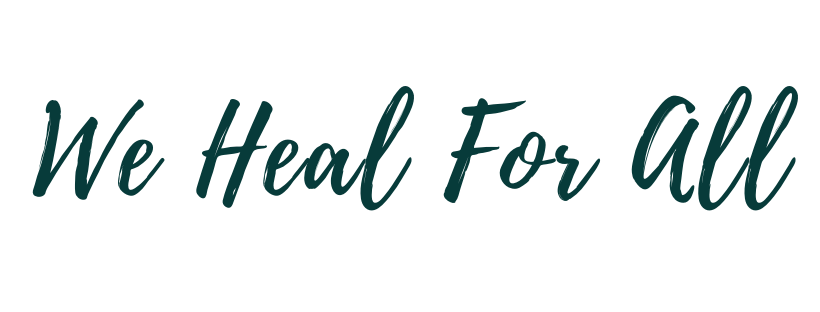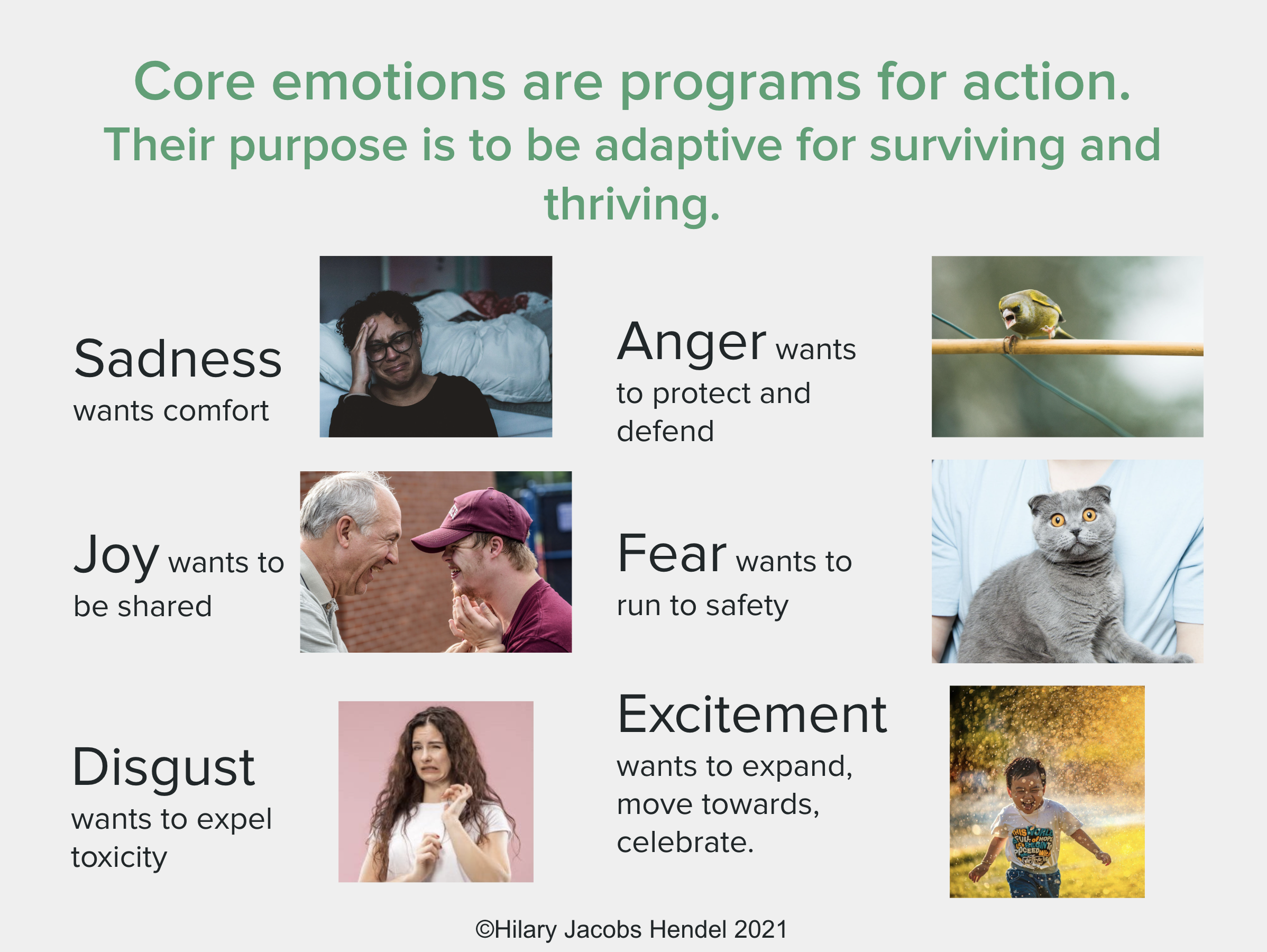You make sense, so might the collective: Evolutionary purpose of emotions
In a lot of the workshops and writing I do, I emphasize that emotions are baked into us by eons of evolution. I often quote Dr. Diana Fosha:
From the foreword It’s Not Always Depression by Hilary Jacobs Hendel
I think this scientifically-backed understanding offers us so much to chew on; both for ourselves as individuals—to destigmatize emotions and to have better tools to work with them—as well as for thinking about collective healing. It can help us explore things like why there is such a high degree of emotional energy in our collective nervous system these days, what it might mean, and what we might do about it.
Writing this has been fun. It has challenged me to put words to something I intuitively sense. Let’s see how it goes!
1. If our emotions are evolutionarily baked into us, then that means they have a purpose.
I wonder if you can relate to ever feeling like your emotions are unacceptable or that they make you weird or defective in some sort of way?
Raise of hands? I’m imagining a good 7 out of 10 people reading this have their hand in the air; and the other 2 or 3 might want to but are shy.
Yes, so many of us have felt this way. I certainly have. Emotions can be wild and raw, and they have all sorts of socially-inherited stories attached to them.
But the idea that they have an evolutionary purpose invites a perspective shift. It helps me see emotions in a new light. It softens judgment and shame, especially around challenging, ‘ugly,’ or ‘negative’ emotions.
It brings in a practical element too. If emotions have a purpose then that means we can learn what that purpose is and weave that understanding into how we relate to them.
2. If they’re part of our evolution as a species then that means they help us survive.
For me, this moves beyond normalizing emotions towards seeing them as allies.
The evolutionary perspective teaches us that starting from when we are born, we have core emotions that are ready to work for us. They let us know what’s good for us, what’s bad, what we need, when we need it, and everything in between.
They can be thought of as ‘programs for action’ that drive us to adapt and respond to what’s going on. To navigate danger, keep ourselves safe, generate life… To survive and thrive!
3. If they help us to survive then that means they have an intelligence to them.
Imagine you’re walking down a trail in the woods. You see a bear. You feel FEAR! Before you’re even aware of it, that fear propels you to run (or hide or grab a stick..).
This is the intelligence of fear. It has an impulse to it (i.e. the impulse to run) that’s based on its evolutionary purpose: to keep us safe and respond to danger.
Every emotion has its own version of this. Whether it’s anger needing to protect or sadness needing comfort. Each one has its own intelligence and impulse based on its evolutionary purpose.
With this, we can begin to become more aware of the impulses we feel, and therefore what the intelligence of our emotions is telling us we need. The impulse behind an emotion is neither good nor bad, it’s how we choose to work with them that’s important.
4. The evolutionary intelligence of emotions lives in the body. It’s biological and part of nature.
In our bear example above, the impulse to run happens in the body.
Before we’re even aware of it, the body—fueled by the intelligence of fear—changes states in order to run. Our blood flow moves from digestion towards our heart and lungs. Our pupils dilate and muscles engage. This all happens unconsciously (check out this clip of me explaining this phenomenon more).
This is because, as an evolutionary tool, emotions have energy to them. This energy drives us to act. That’s why emotions are physical and occur in the body—to get us to move. In this way it’s part of our nature to have emotions. It’s inherent to being a mammal.
5. All of this helps me zoom out and see from a bigger-picture lens.
In a way, this evolutionary perspective helps me have a little bit more space between me and my feelings. When a big emotion arises, instead of feeling enmeshed with it or over-identifying with it, I can zoom out and hold a bigger-picture lens to my experience.
This lens helps me get curious about the sensations in my body, knowing they have an intelligence to them. I can explore them as if they are bread crumbs leading me down a path to what I need.
Understanding that emotions carry energy makes my need to process what I’m feeling just a practical exercise, instead of a shameful taboo. The need to process my emotions—with a therapist, while journaling, with a friend—has simply to do with the physics of my system. The energy that comes with emotions needs to be felt and released. And there are certain types of support and conditions that help me do so in a constructive way.
Snippet from my self-paced course, Emotions 101 with Yoga
How does this evolutionary view relate to collective healing?
The reason why I launched We Heal For All is because there’s this Divine restless nudge within me that continuously moves (and beckons!) me to explore and think about our collective system* as if it’s an individual system. I can rationalize this and see why–we know so much more about healing at an individual level than we do about what it means to heal collectively. So this sensing experiment makes sense.
Yes, this Spiritual force calls me to play with a fractal-like scope of seeing. While writing this piece, my mind has been going in and out between the individual and the collective, holding the question: What can we take from what we know here, about the evolutionary purpose of emotions within individuals, and apply it to the collective?
Perhaps Spirit calls me to do this as an artistic expression. Perhaps as something that bears practical fruit. Perhaps all of the above and more. All I know is that I need to do it, and I hope you come along on this ride with me, and share and weave in what it brings up for you.
⎯
If I look at society as a collective body that has its own nervous system, it’s easy for me to see vast amounts of fear, anger, disgust, and sadness alive within it right now. I see it reflected in the news cycle, in political rhetoric, in widespread polarization, in the fragility and fire of social unrest. We’re* holding a lot right now. And our awareness of all that we’re holding has never been greater.
For me, far from this being a sign of our imminent doom or collapse, the collective grief and rage and confusion signal, to me, that we’re in the midst of an evolutionary process of change. Looking to the individual level for inspiration, perhaps the presence of all of this emotional energy means that we as a system are being propelled towards something new; and that the purpose behind these intense, widespread feelings is to help us get there.
From this view, the evolutionary perspective helps me hold the collective outbursts and outcries as being part of a deeper, longer process. That instead of them being a sign of some sort of latent defectiveness, that it’s actually a reflection of an inherent intelligence within our system that is coming to the surface to help us adapt. Looking at things this way means that we have an opportunity to do big, beautiful healing work right now. If we can figure out ways to work with this energy–within ourselves, our families, our communities, our institutions, the media, our policies–in constructive, powerful ways then we can use it to help us transform ourselves as a society.
The idea that the emotional energy in our collective system right now could be utilized and serve as generative, informative material for our next steps as a people inspires me. I’m not starry-eyed and naive about this, though, as I fully recognize (and feel and see) that it’s far from what’s actually happening. If anything, old harmful cycles are being perpetuated as people don’t know what to do with the collective energy that’s present, and the energy doesn’t have the proper support and outlets to be transmuted.
This is why I believe that Spirit keeps imploring me to explore this. Because of the potential we have in front us. And this notion–that this emotional energy and what’s happening is here for a reason–feels like a baseline first step towards continuing to unpack and get creative with the question of: what does collective healing mean in practice?
I’m curious what you think. If moved to do so, I’d love to hear what has come up for you while reading this. Images, feelings, sensations, thoughts, doubts, critiques, inspiration. All are welcome when shared with respect and decency.
*I use the term ‘collective system’ and pronoun ‘we’ here to mean the collective bodies I’m part of and in relationship with, acknowledging that there is no such thing as a universal ‘we’ when it comes to talking about society and that there are many collective systems that make up our greater whole.
Hi, I’m Liz Moyer Benferhat. Writer, facilitator, coach, and development practitioner dedicated to the subtle interplay between how inner transformation feeds the outer transformation that’s needed in the world. Welcome 🌿



